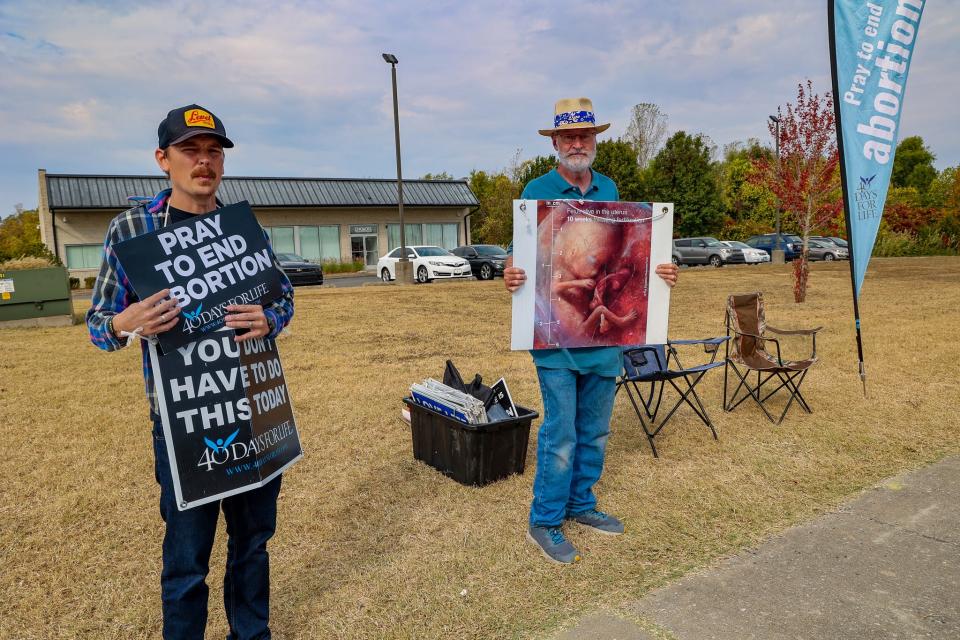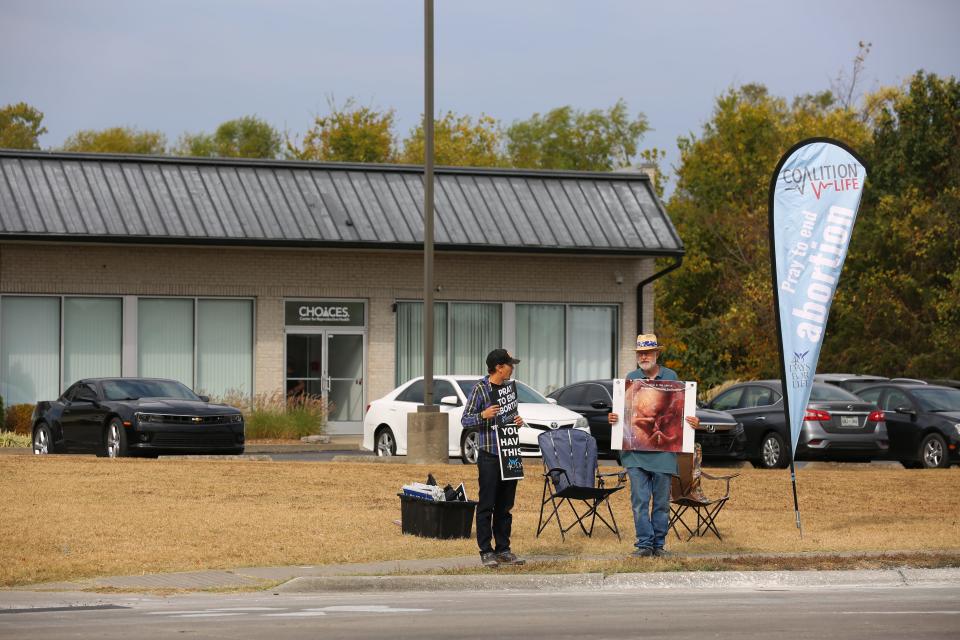Amid growing 'abortion deserts,' a haven in small-town Illinois takes shape
CARBONDALE, Illinois — In a former dermatologist’s office in this small Southern Illinois town, the first health care facility to offer abortions in decades opened quietly on Tuesday – accompanied by a small handful of opponents holding protest signs outside.
The CHOICES Center for Reproductive Health is one of at least two abortion clinics moving into 21,700-resident Carbondale, a Midwest college town thrust into the spotlight amid expectations it will serve as a key oasis of access for what abortion rights advocates say are the growing U.S. "abortion deserts" clustered in the Midwest and South.
Carbondale will be home to Illinois’ southernmost clinics. Already, a Planned Parenthood clinic 80 miles to the northwest is seeing skyrocketing demand amid state bans following the Supreme Court’s reversal of the federal right to abortion.
“Carbondale, geographically, is the closest point of access for hundreds of thousands of women throughout the South. That's what makes it so important,” Jennifer Pepper, the chief executive officer of CHOICES, told USA TODAY on Tuesday.
MORE FROM ILLINOIS: Planned Parenthood to launch mobile abortion clinic
The city, a largely progressive town home to Southern Illinois University but tucked into a more conservative and rural part of the abortion-rights state, is just one place where the shifting map of post-Roe abortion access is unfolding to both support and opposition.
Anti-abortion activists are in the midst of a 40-day protest, sending several opponents to spent part of each day outside the clinic. Organizers vow to fight them by spending money on everything from billboard advertising to expanding a pregnancy center that seeks to steer women away from abortion.
“The people of Southern Illinois do not want abortion,” said Brian Westbrook, the director of St. Louis-based organization Coalition Life, which is helping organize opposition.

Since the high court overturned Roe v. Wade in June, at least 66 abortion clinics in 15 states have stopped offering abortion services, according to a recent report from the Guttmacher Institute, an organization that supports abortion rights and provides research and policy analysis on reproductive health issues.
Thirteen of the states – Alabama, Arizona, Arkansas, Idaho, Kentucky, Louisiana, Mississippi, Missouri, Oklahoma, South Dakota, Tennessee, Texas and West Virginia – have enacted near-total abortion bans since June, while providers in Wisconsin have suspended abortion services because of uncertainty about the enforceability of an 1849 ban. In Georgia, one clinic closed while 13 still offer abortion services during the first six weeks of pregnancy.
POST-ROE: Abortion bans from the 1800s became legal matters in these states
WHAT HAPPENS TO IVF? People struggling to conceive worry embryos are at risk
A total of 26 states are certain or likely to ban abortion by next summer, according to Guttmacher.
"I think access is going to continue to deteriorate over the next six months to a year," Pepper said.
The two incoming clinics in Carbondale, where a hospital last halted elective abortions in the 1980s, are among those moving across state lines to continue their work.
CHOICES, which had to stop providing abortions in Tennessee, has in recent weeks worked to train staff and move equipment. But it spent months fostering local support. And most in town have so far welcomed them, Pepper said.
A second clinic that's set to open this fall operated Alamo Women’s Clinics in San Antonio, Texas, and Tulsa, Oklahoma, before restrictions led them to open in Carbondale along with a site in New Mexico, said Andrea Gallegos, executive director of Alamo Women’s Reproductive Services.
Carbondale was picked in part because it’s just 50 miles to the state's southern border and near states such as Kentucky, Tennessee and Missouri that have banned it. It’s also on a major interstate and a passenger train line that runs to New Orleans.
All that means high demand is expected from out-of-state clients. The Illinois Planned Parenthood clinic near St. Louis saw a 435% increase in patients from beyond Illinois and Missouri between June and September, Dr. Colleen McNicholas, the group's chief medical officer, recently told USA TODAY.

In Carbondale, some local activists and groups are organizing volunteer support systems, such as housing for people traveling far distances who need to stay overnight. Nancy Maxwell, community outreach manager at the Survivor Empowerment Center, said her domestic violence shelter may offer space when possible.
But even with some abortion rights groups aiding women with money or transportation, advocates say many people will face steep barriers to reaching Carbondale, especially those of little means who must get time off work, and find child care and transportation.
"We are seeing states divide into abortion deserts, where it is illegal to access care, and abortion havens, where care continues to be available," according to an analysis by the Center for Reproductive Rights. "Millions of people living in abortion deserts, mainly in the South and Midwest, are forced to travel to receive legal care, which results in many people simply being unable to access abortion for a variety of financial and logistical reasons."
Carbondale City Council member Adam Loos said most elected officials support the presence of the clinics and lack any authority to prevent their opening, despite one council meeting during which some opponents asked they do so. He said many residents support it as well.
Critics, including some area ministers, say they don’t want to be known as an abortion destination and are working to build a long-term opposition.
“The presence of abortion facilities and the level of activity – of having multiple ones – has shocked a lot of people here,” said The Rev. Mark Surburg, of Good Shepherd Lutheran Church in nearby Marion, Illinois.
Whether the small-town clinics will face sustained protests, as some in larger cities often do, remains unclear. But Pepper and Gallegos said they are no strangers to working to provide access in the face of opposition.
Speaking at a recent event last month, Pepper said the clinic would first offer medication abortion and gender-affirming care, with in-office procedural care to follow. The clinic will eventually provide a range of reproductive and other health care.
Even before a draft of the Supreme Court decision overturning Roe was leaked, many advocates had seen access wither in states where Republican-dominated legislatures passed ever-restrictive laws.
Pepper said when the Supreme Court took the Dobbs case, they didn’t wait to start looking ahead to new locations.
“It’s been a hard year, y’all,” she told the gathering of supporters last month, adding, “We’re here for the long run.”
Contributing: Bill Keveney, USA TODAY.
Chris Kenning is a national news writer. Reach him at ckenning@usatoday.com and on Twitter @chris_kenning.
AFTER ROE: NY college to offer abortion pills for students
WHAT CHANGED? Abortion opponents are less accepting of rape, incest as 'exceptions' ss
This article originally appeared on USA TODAY: Abortion clinic opens in Carbondale, Illinois amid healthcare 'desert'

